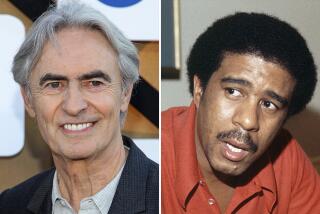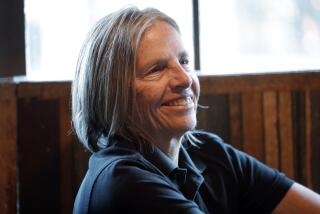Dispatches From the Sexual Front : HOT AND BOTHERED: Sex and Love in the Nineties, <i> By Wendy Dennis (Viking: $20; 273 pp.)</i>
The 1950s and ‘60s were as separated from each other on issues of sexual propriety as Jane Austen and Erica Jong. Why issues of change were compressed into such a short interstitial moment is a major anthropological puzzle, but there it is, laid out in the strata of history. In one decade we see the fossils of reluctant virgins; in the next the skeletons of women extinguished by early sexual exhaustion.
Wendy Dennis, budding erotically in the ‘60s and flowering in the ‘70s, belongs to that rare, perhaps never-to-be-seen-again species of woman who was educated to believe that the sexual act could be an entity separate from everything else: from childbirth, power struggles, theology, personality, social governance, disease, aging and marriage. Sex was supposed to be a connection embodying the blissful equality of nirvana, a taste of unencumbered ultimate reality.
For the record:
12:00 a.m. Oct. 4, 1992 FOR THE RECORD
Los Angeles Times Sunday October 4, 1992 Home Edition Book Review Page 15 Book Review Desk 1 inches; 14 words Type of Material: Correction
The illustration for “Dispatches From the Sexual Front” (Sept. 13) was by Jean-Paul Buquet-Banzali.
Of course, those of us who sent forth hesitant pheromones in the ‘50s knew sex as the troublesome snake-in-the-grass our ancestors had always taught us it was. We wanted to believe! Oh, how we joined the processions to the holy fires of bra-burning and the radical circumcision of the hemlines! We felt younger; we attempted a few cultic practices, but down deep we knew that sex meant everything. It required caution. We were playing with the gods by attempting to trivialize its passions and punishments.
Judeo-Christian theology had taught us that to bite the forbidden fruit meant to labor in pain for the rest of our days. We grew up with the vivid memory of syphilis. We understood that to avoid the dismal sequelae of conjugal union, queens of old appreciated their kings’ concubines. And our teachers and models were generally spinsters whose lives were testimony to the fact that sex took up enough time and emotional energy to preclude sufficient devotion to good works. We were, therefore, suspicious of the second coming of that jaundiced apple.
“Hot and Bothered” is, in part, a new version of an old stylistic genre. Basically, it’s a lamentation, a complaint, a book of Job, a crying out against promises unfulfilled, a confession of bitter disappointment at not receiving a happiness that was all but delivered. Believing that sex was an easy god to please, humankind suffered many retributions. Wendy Dennis enumerates them:
Women are now depressed because men, as a sexually available gender, seem to be disappearing. Women are angry because the they have relationships with are not good and true. Women are embittered because they have carved impossibly solo journeys through life for themselves and their offspring by jettisoning male support. Women are confused because they honestly want sexual equality but are erotically attracted to male superiority. The ambivalence is so extreme that many, like Germaine Greer, are dispensing with sex altogether. A few are settling for merely physical relationships. Even as they deny AIDS and have sex without condoms, women are declining sex for the pain, grief and rejection it causes, not to mention the time it takes away from harvesting the fields for bread. (A familiar position for the ‘50s novitiate.)
Men, too, are depressed. They want to learn to love Woman as an equal, but they want to be better than she is. They don’t know why women are so angry at them. They are lonely without women’s nurturance. They feel like objects, like means to an end. So they are betaking themselves to permanent bachelors’ apartments, to the aprons of their mothers, or to retreats in the hills where they can bang drums or fleece their private sheep in solitude.
The culmination is that, having stripped sex of love, no one seems to want it plain any more. Men may once have wanted lust because it made women suffer and beg for love, but they are unwilling supplicants when women turn the tables.
From this Pandora’s box of mixed emotions fly thousands of demons, enlarged, fattened and made lethal by AIDS. These winged devils make every aspect of sexual communication a trap, a risk, a bore, a disaster. Flirting, dating, kissing, “transishing” (having a transitional relationship), discarding, committing--all become grenades and land mines.
Originally conceived as an article for the Toronto Star on “Sexual Etiquette in the Nineties,” the core of this book details all the slings and arrows. “Hot and bothered” doesn’t mean only sexy and anxious; it also means frustrated and enraged. Nothing goes smoothly any more. (Of course, it never did.)
But “Hot and Bothered” is more than just a book of grievances. It is also a satire that may be the best stand-up commentary on sexual dilemmas to appear in the bookstores in decades. If Dennis can deliver her tough, salty lines to the TV camera as well as she belts them across the page, she could become the champion comedienne of sexual malaise. She tells the tragedy of our times with a demotic, politically conscious humor that is somewhere between performance art, rap and heavy metal. Ostensibly, the war stories are told by random respondents to the author’s questions, but a selection factor seems to favor the grim hilarity of battle-weary, sharp-tongued interviewee who knows exactly how and where to put it but generally chooses not to.
Reading Wendy Dennis is not for the faint of language. Much of the humor comes from the unexpected use of jargon combined with a liberal seasoning of that antique word that has survived since the beginning of English. For one tame example, the first line of her introduction is classic: “In the sixties, when I discovered sex, there was no such thing as a politically correct blowjob.”
Another example, also relatively benign, but typical: “You don’t have to be a member of Mensa to figure out what the psychological penalty has been: bewilderment, anger, emotional shell-shock, power struggles, blame-throwing, name-calling. Naturally, a lot of people are having a tough time getting laid through all of this.”
But, alas, like the ‘60s and ‘70s, “Hot and Bothered” tries to accomplish too much. The pages of self-evident advice, the exhortations to truthfulness, intimacy and sweetness, may best be left unspoken in the rough company that Dennis keeps, the people who name sex organs and sex acts with the shortest possible words and who might barf if their girlchild requested “Cinderella” on videotape. Jonathan Swift made his point without prescribing lifestyles. But I suppose we can forgive Wendy Dennis her flushes of proselytizing idealism. Perhaps we all wish for the return of love, even if it never came to stay.


